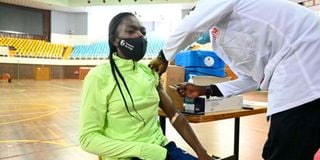Of Covid and its sister, poverty

Kenyan athlete Mary Moraa receives Covid-19 Jab at Moi International Sports Centre, Kasarani on July 8, 2021.
What you need to know:
- The vaccine inequality has been a revision class in the true nature of the modern state.
- In that sense, hoarding vaccines cannot be explained away only as a lack of compassion or even racism.
Still contending with Covid-19, and curfews, it can be hard to imagine that elsewhere it’s largely back to business as usual.
Perhaps, it is why reports emerged in late June that, thanks to vaccinations and the end of coronavirus-related restrictions, the world economy is not just back to its pre-pandemic level but has surpassed it. With a 6.0 per cent growth forecast for this year, the global economy will post its biggest expansion in nearly 50 years.
In that month, Kenya, Uganda, Rwanda and other countries were still under fairly stringent lockdown.
On the weekend, Fareed Zakaria had American economist and 2008 winner of the Nobel Prize in Economics Paul Krugman on his Global Public Square (GPS) show on CNN to discuss Covid-19 and the global economy. The issue of a rebound to pre-pandemic growth of the global economy came up with Zakaria pressing Krugman on the issue.
Krugman is a sensible and sensitive man but he is also one of those economists who goes where the data takes them. Shifting a little uneasily, he argued that it was not a contradiction that the global economy was on fire when most of the poorer parts of the world were still besieged by the virus because, in the bigger scheme of things, they contribute little to nothing to the international economy.
It is a familiar picture for us. It is like elections in many poor countries, where the vote that counts is not that of the general electorate but the president and the chaps he appointed as electoral commissioners.
Vaccine apartheid
The discussion didn’t go there but it still said something about the current controversy about the so-called “vaccine apartheid”, with the rich nations having enough doses to inoculate their entire populations six times over while low-income ones in Africa, Asia, Latin America and the Middle East have barely immunised three per cent of their citizens.
Last week, our brother from Ethiopia, Tedros Adhanom Ghebreyesus, who is the chief of the World Health Organization (WHO), called upon rich nations to halt Covid-19 vaccine boosters until at least 10 per cent of the population of every country is vaccinated by the end of next month. They heard him, but didn’t listen, and are moving ahead.
The countries that play the game are rewarded with global influence — which itself is meaningless without direct money-in-the-wallet and concrete rewards like access to markets for your companies’ goods and services, resources or votes at the United Nations in support of global causes that serve your national interest and national security.
The vaccine inequality has, therefore, been a revision class in the true nature of the modern state. In that sense, hoarding vaccines cannot be explained away only as a lack of compassion or even racism. It’s deeply structural. You can’t be an American or Briton and denounce vaccine apartheid without renouncing your privileges as a citizen of those states and expect to be taken seriously by the discerning.
Secondly, it is an old lesson in the power of money. If you are poor, you are not able to purchase global standing. If your Treasury can’t write a $1 billion cheque to Pfizer or Moderna for a large vaccine order, and you have to get it as a donation or funded by donors, then you will be at the back of the queue.
Economic growth, and the uplifting of the livelihoods of people, therefore no longer need to be pursued for mushy reasons like love and care but hard-nosed strategic and national interest considerations.
Delivered last
Some experts predict that we are going into a world upended by climate change ravages and viruses that have jumped animals swept up from the forests by floods and delivered to our streets, or in our invasion of nature reserves in search for places to live, and farm to feed a growing world population.
If we are poor, our orders for global goods like vaccines to tackle these perils will be filled and delivered last.
This brings up why we remain poor. We know the stories — corruption, idiocrats controlling power, predatory violence that destabilises people and production, a global system rigged against us and so forth.
Seldom mentioned is that large sections of the African political class has instrumentalised poverty and, therefore, doesn’t do even the simplest of things that would bring prosperity. Poor people are easier to control. The balance of power favours those who hold the purse strings, so much so that the people aren’t able to bargain with them, hold them to account or even vote them out.
Covid-19 has shattered the poverty tool. Time to try a new trick — like seriously ending poverty.
Mr Onyango-Obbo is a journalist, writer and curator of the Wall of Great Africans. @cobbo3





